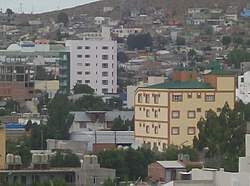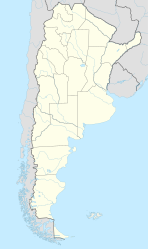Caleta Olivia
| Caleta Olivia | |
|---|---|
| City | |
 |
|
| Location of Caleta Olivia in Argentina | |
| Coordinates: 46°26′S 67°32′W / 46.433°S 67.533°WCoordinates: 46°26′S 67°32′W / 46.433°S 67.533°W | |
| Country |
|
| Province | Santa Cruz |
| Department | Deseado |
| Founded | November 20, 1901 |
| Founded by | Exequiel Guttero |
| Government | |
| • Mayor | Jose Manuel Cordoba |
| Area | |
| • Total | 55 km2 (21 sq mi) |
| Elevation | 13 m (43 ft) |
| Population (2010) | |
| • Total | 70,304 |
| • Density | 1,300/km2 (3,300/sq mi) |
| Time zone | ART (UTC-3) |
| CPA base | Z9011 |
| Dialing code | +54 297 |
| Climate | BSk |
| Website | Official website |
Caleta Olivia is a city located at the northeast of the Argentine province of Santa Cruz, on the San Jorge Gulf by the Atlantic Ocean. It has a population of 70,304 inhabitants (2010 census [INDEC]). It is the second most important city of the province after Rio Gallegos, and the most populated of the Deseado Department.
The city was founded on November 20, 1901 by Navy Lieutenant Exequiel Guttero, captain of the Guardia Nacional, a ship which was transporting cables, equipment and workers for the construction of a telegraph line south of Comodoro Rivadavia. The settlement was given the name of his wife Olivia (caleta means "small bay", "inlet").
The main economic activities around the city are the petroleum, sheep and fishing. Its port serves both as a fishing centre, and as an exportation point for other locally produced goods.
Among the monuments of the city, probably the most characteristic is that of "El Gorosito", build to honour the petroleum industry worker.
In spite of the southern position of the city, it has moderate temperatures due to the regulation of the ocean, with beaches visited during sunny days in summer, where different water and sand sports are practiced. It has a cold semi-arid climate (Köppen climate classification BSk) with warm summers and cold winters. Precipitation is sparse, averaging 200.7 mm a year.
...
Wikipedia

